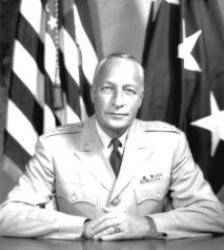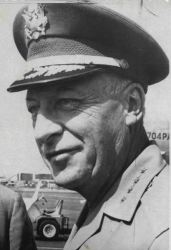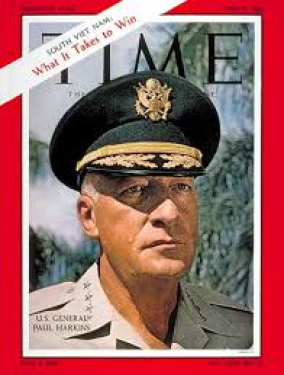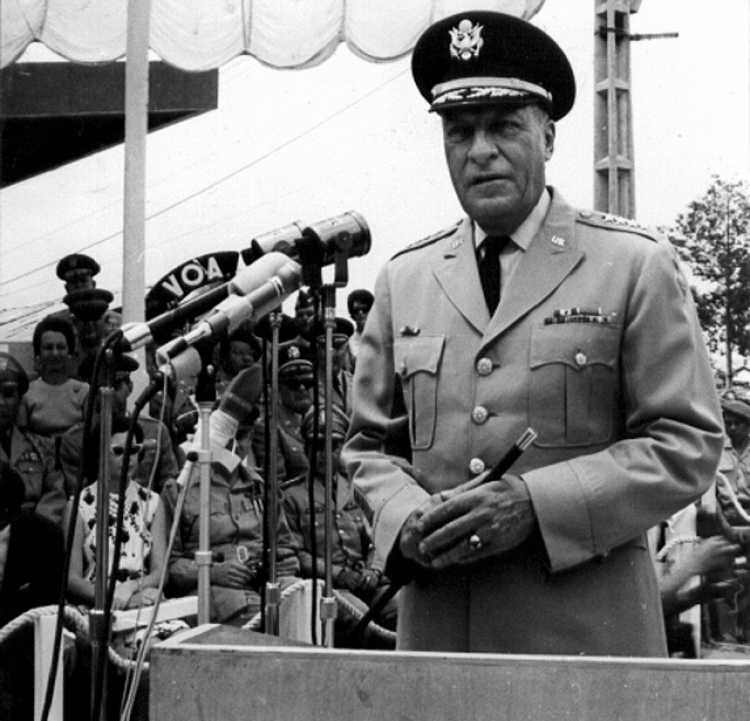
 |
|
|
||
|
Paul Donal Harkins 'Ramrod' |
||||
|
Graduate, U.S. Military Academy, Class of 1929 Engagements: • World War II (1941 - 1945)• Korean War (1950 - 1953)• Vietnam War (1960 - 1973) |
||||
| Biography: | ||||
|
Paul Donal "Ramrod" Harkins Paul Donal Harkins was born on 15 May 1904 in Boston, MA. He attended the U.S. Military Academy and graduated with the Class of 1929. He was then commissioned as a Second Lieutenant in the U.S. Army. World War II Harkins was Deputy Chief of Staff, Third Army, under General Hobart R. Gay. While in that capacity he earned the nickname "Ramrod" for his determination to fulfill Patton's desire to always keep moving. A fellow officer asked Harkins "how the devil our G.I.s can remain so cheerful at the front under these frightful conditions?" Harkins is said to have replied, "Well the Old Man [General George S. Patton, Jr.] knows that as long as they are winning and moving forward they will remain happy and their morale will be high." In his capacity as deputy of operations for Third Army, Harkins was present with Patton at the famous staff meeting called by General Dwight D. Eisenhower to discuss the Allied response to the German attack in the Ardennes. Patton promised Eisenhower that his Third Army would be ready to disengage troops from their current eastward attack and move north approximately a hundred miles to counter-attack in three days. That was a task that seemed impossible at the time. West Point Cheating Scandal Harkins, Commandant of Cadets and Head of the Tactical Department at West Point, was informed by a first class cadet on 2 April 1951, that a classmate had told him that there was a group of cadets, mainly among the football team, who were involved in a cheating ring. Harkins had made it plain that he felt that the nationally ranked football team was not in line with his vision of the USMA. In a controversial decision, he asked cadets to gather information about the cheating; eventually a formal inquiry was held and ninety cadets were dismissed from the academy, some of those had not participated in the cheating but knew of it and had not reported it, which was considered a breach of the Cadet Honor Code (A cadet will not lie, cheat, steal, or tolerate those who do). The head coach for Army at that time, Earl "Red" Blaik, felt that Harkins was "a black and white man with no shades of gray" and accused him of bias. Blaik's son was one of the cadets who knew of the cheating but had not acted. Vietnam The initial U.S. build up in the Vietnam War occurred during his watch. Harkins appeared on the cover of Time magazine, (What it Takes to Win 11 May 1962), where he was described as "look(ing) every inch the professional soldier." The article went on to the U.S. commitment to stay in Vietnam even if it took a decade, quoting then Attorney General Robert Kennedy from November 1962, "We are going to win in Vietnam. We will remain until we do." Controversy At the beginning of his command of Military Assistance Command, Vietnam (MACV), Harkins and his staff repeatedly expressed optimism about the course of the war. However, as the conflict escalated, many reporters began to feel that what they were seeing in the field and being told 'off the record' (by officers such as Lieutenant Colonel John Paul Vann) did not match the information being released by MACV. In particular, the Battle of Ap Bac, had a serious affect on the view of many reporters regarding the credibility of the Army, and of Harkins in particular. When details of the battle emerged that differed from the Army's official version, it became a very serious matter and the ensuing press reports embarrassed the Kennedy administration. Harkins was described by Neil Sheehan as an "American General with a swagger stick and cigarette holder...who would not deign to soil his suntans and street shoes in a rice paddy to find out what was going on…was prattling about having trapped the Viet Cong." New York Times Vietnam correspondent David Halberstam became so angry with Harkins he refused to shake his hand at a Fourth of July celebration hosted at the U.S. Embassy in Saigon. When the hosts called for a toast to Harkins, Halberstam shouted "Paul D. Harkins should be court-martialed and shot!" [His compatriots complied with the toast for Harkins.] Time magazine correspondent Lee Griggs and Mecklin parodied the General in song at one time for saying the war was "well in hand." We are winning, this I know, General Harkins tells me so. Griggs recalls that the General overheard this and "did not smile." Interesting Note Re the Controversy Army Vice Chief of Staff General Bartlett Hamlett participated in the escalation of the Vietnam War while in office. Reflecting on this period later, Hamlett said, "I think the most important thing was something I didn't recommend; and that was that we didn't become involved in Vietnam to the point where we would have to commit combat forces. I think it was a failure, and I would have to say that I shared the responsibility because I didn't see far enough ahead to speak out." General Hamlett was receptive to dissenting views about the progress of the war, most notably arranging for Lieutenant Colonel John Paul Vann to brief the Joint Chiefs of Staff (JCS). "Vann had a lot to say about what was going on in Vietnam, which was completely counter to the reports we were receiving through JCS channels. And they were so different that I wanted him to brief the Chiefs." On his own authority, Hamlett scheduled the briefing for 8 July 1963, but it was canceled at the last minute by Army Chief of Staff Earle G. Wheeler at the behest of JCS chairman Maxwell D. Taylor, whose protégé, General Paul D. Harkins, Commander of U.S. forces in Vietnam, was producing the optimistic reports that Vann's briefing was intended to contradict. Harkins' Comment to His Replacement, General Westmoreland As interviewed later by historian Michael MacLear, the incoming commander replacing Harkins in 1964, General William Westmoreland, recalled that he got varying readings from the outgoing Harkins, whose favorite poet was Kipling, and when veering from optimism to pessimism would, according to Westmoreland, "constantly" quote a version of Kipling for him: The end of the fight is a tombstone white Said Westmoreland: "I'm very fond of Kipling because he's a soldier's poet," but he confessed: "I didn't take it quite to heart." The reason given by MacLear being that neither Kipling nor even MacArthur - no one in the history of war - had ever known the mobility and fire-power that Westmoreland had been promised by Secretary of Defense McNamara, and was shortly to command. When Harkins left in June 1964, there were between 11,200 and 16,000 U.S. troops in Vietnam. His successor, Westmoreland, raised the levels to 500,000 men by 1968. Author In 1969, Harkins wrote a book on General George S. Patton Jr. and Third Army titled When the Third Cracked Europe: The Story of Patton's Incredible Army. Harkins is credited as a technical consultant for the 1970 film Patton. Medals and Awards Army Distinguished Service Medal (3 Awards) Death and Burial General Paul Donal Harkins died on 21 August 1984. He is buried at the United States Military Academy Post Cemetery in West Point, Orange County, NY, in Section IX, Row A, Grave 053. |
||||
| Origin of Nickname/Handle: | ||||
|
During WWII, as Deputy Chief of Staff, Third Army, he earned the name Ramrod for his determination to fulfill Gen. George Patton's desire to always keep moving. |
||||
| Honoree ID: 247 | Created by: MHOH | |||
Ribbons
Medals
Badges
Honoree Photos
 |  |  |
 |  |
 |


